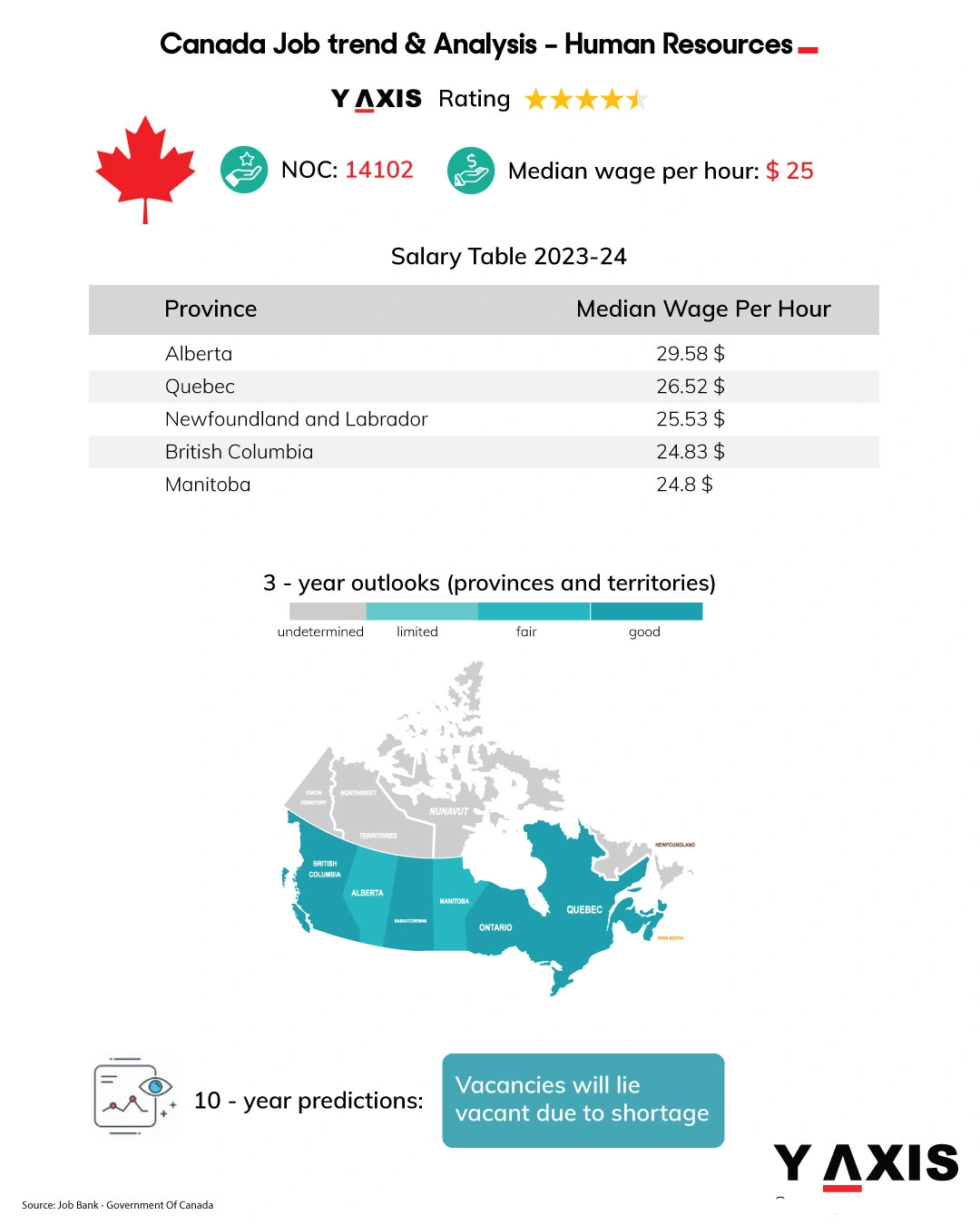Posted on November 24 2022
Canada Job Trends - HR, 2023-24
By , Editor
Updated October 27 2023
Why migrate to Canada as an HR?
- HR is the fourth most sought-after occupation in Canada
- Over one million job vacancies in Canada
- HR professionals make up to CAD 138,300 per annum
- Four routes for HR professionals to relocate to Canada
- Manitoba and Ontario have many vacancies for HR professionals
About Canada
Canada is very popular among immigrants for its accommodating policies. It recently made public its New Immigration Levels Plan for 2023-2025.
This year, Canada increased its immigration target, and the same was publicized in its Immigration Levels Plan for 2023 to 2025.
Canada has increased target levels for immigration by planning to allow about 432,000 immigrants into the country by the end of this year. The targets in the immigration level plan from 2023 to 2025 are as follows:
| Immigration Class | 2023 | 2024 | 2025 |
| Economic | 2,66,210 | 2,81,135 | 3,01,250 |
| Family | 1,06,500 | 114000 | 1,18,000 |
| Refugee | 76,305 | 76,115 | 72,750 |
| Humanitarian | 15,985 | 13,750 | 8000 |
| Total | 4,65,000 | 4,85,000 | 5,00,000 |
Read more... Canada immigration levels plan 2023-2025; 1.5 million immigrants by 2025
Job Trends in Canada, 2023
At present, Canada’s unemployment rate is at a record low of 5.4% with around more than 1 million job openings in the country.
Some of the sectors where skilled workers are in demand include:
| Sectors | Vacancies |
| Social assistance and health care | 1,43,400 |
| Accommodation and food services | 1,61,100 |
| Retail trade | 99,200 |
| Manufacturing | 86,800 |
| Transportation and storage | 51,100 |
The average weekly income is CAD 1,159.
HR Professionals – 1121 NOC Code
The profession of HR or human resources in Canada has undergone a sea change in the last decade. Previously, the job of an HR was considered with normalizing discipline issues of employees, sustaining office policies, and hiring or sacking people.
As businesses become more driven in nature, and with more young people becoming a part of the workforce, a major trend is clearly visible in the HR’s tasks and perception.
It is now common to see HR specialists taking an active part in strategy sessions with CEOs and professionals to discuss the prominence and outcomes of employee engagement, improving skills, and hiring talent.
In most sectors of the Canadian economy, HR has become crucial and necessary for achieving success in business.
Although HR professionals are needed in most sectors, there is a higher demand for HR professionals in specific verticals in Canada. The various industries where there is an increased demand for HR professionals are given below:
- Manufacturing
- Education services
- Social assistance
- Healthcare
- Finance
- Insurance professionals
- Scientific services
- Technical services
As all these sectors provide work for many people, they require HR professionals to tackle both hiring activities and staff management. HR professionals in Canada need to lure and hire highly skilled specialists for the workplace.
Existing salaries of HR Professionals in Canada
HR professionals in Canada take home an average of CAD 59,414 per year or CAD 30.47 per hour. The salary for newcomers begins at CAD 44,900 per year, while seasoned professionals make up to CAD 138,300 per year.
The salaries of HR professionals across Canada’s territories and provinces are given in the table below:
| Income of HR Professionals in Various Provinces & Territories of Canada | |
| Provinces/Territories | Yearly Income (CAD) |
| Nunavut | 81,861 |
| Yukon | 72,706 |
| British Columbia | 68,364 |
| Alberta | 66,131 |
| New Brunswick | 63,803 |
| Ontario | 62,389 |
| Manitoba | 57,459 |
| Saskatchewan | 56,706 |
| Nova Scotia | 54,443 |
| Quebec | 50,854 |
| Prince Edward Island | 49,100 |
Eligibility Criteria for HR Professionals in Canada
The eligibility requirements that HR professionals in Canada need are:
- A college diploma or university degree in human resources management or other related fields, such as:
- Business administration
- Industrial relations
- Commerce
- Psychology
- Completing a professional development program in HR administration
- Some organizations in Canada may want to hire HR professionals who have a CHRP or Certified Human Resources Professional designation.
- The expected work experience
HR Professionals - Number of vacancies in Canada
The requirement for HR professionals in Canada touched 4th position in 2022, jumping from the 7th position in 2021. It is expected to go higher in the next few years.
The job openings for HR managers in Canada’s various provinces are given below:
| HR Manager Job Vacancies in Various Provinces of Canada | |
| Location | Available jobs |
| Alberta | 21 |
| British Columbia | 27 |
| Manitoba | 1 |
| New Brunswick | 9 |
| Nova Scotia | 7 |
| Nunavut | 1 |
| Ontario | 68 |
| Québec | 37 |
| Saskatchewan | 9 |
| Yukon | 1 |
*Note: The number of job vacancies may differ. This is given as per the information on October, 2022.
How can HR Professionals migrate to Canada?
HR professionals can migrate to Canada under the FSWP or Federal Skilled Worker Program. The eligibility requirements for FSWP are:
| Federal Skilled Worker Program (FSWP) | |
| Eligibility Requirement | Description |
| Work Experience | One year within the last 10 years |
| Language Skills | Excellent English or French language proficiency |
| Job Offer | Not required but can increase your CRS points |
| Education | Minimum of a high school diploma or higher |
The other pathways to immigrate to Canada for HR professionals are:
- Express Entry Immigration
By submitting a profile in the Express Entry pool, one can obtain a provincial nomination. The applicant needs a score of 600 points or more in the CRS or Comprehensive Ranking System. Applicants get a nomination in the province if they satisfy the required abilities that the Canadian authorities have set.
- Intent to settle in Manitoba
There is a huge demand for HR managers in Manitoba, implying that applicants can easily get nominations when they apply to the immigration pathway of Manitoba known as the Skilled Worker from Overseas Stream.
HR managers earn an annual income of CAD 110, 036 which exceeds the average Canadian salary. The province of Manitoba is relatively more inexpensive when compared to the other provinces in Canada.
- Job offer in Canada
After the candidates apply for a job in Canada, they can start working in job roles in human resources for at least one year before they can apply for Canada’s PR or permanent residency.
Work experience in Canada affords the candidates increased immigration options and raises the CRS score.
The candidates are better placed to get a provincial nomination from a particular province of Canada where they have worked and acquired work experience in Canada.
Besides work experience, the candidates will also be in a position to develop a significant network of professionals in Canada and gain experience of how it would feel to live in Canada for a long time.
How Can Y-Axis helps HR Professional to immigrate to Canada?
These following services are offered by Y-Axis for the high probability of immigration to Canada:
- Check your eligibility to Canada through the free Canada Immigration Points Calculator
- Get career counseling for a career in Canada
- Ace your tests like IELTS and PTE with expert guidance in coaching services
- Job search services – linked in, resume writing
- Get guidance to apply for Canada PR
Do you want to work in Canada? Contact Y-Axis, the leading Work Abroad Consultant.
If you found this blog helpful, you may want to read...
Tags:
Canada Job Trends - HR
Work in Canada
Share

